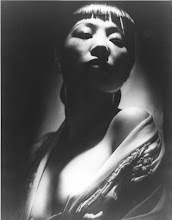February 14, 2004 [Photo] During her career, Anna May Wong was criticized by Chinese for her scanty outfits and for perpetuating stereotypes. But she was also revered for demanding parity with white.

During her career, Anna May Wong was criticized by Chinese for her scanty outfits and for perpetuating stereotypes. But she was also revered for demanding parity with white.
[Photo] ‘Perpetually Cool" Late actress Anna May Wong defied expectations By Yayoi Lena Winfrey
For the Northwest Asian Weekly
Growing up in Victoria, B.C., Anthony B. Chan often heard his parents rave about a favorite film. Released in 1932, the same year that Chan’s parents were married, “Shanghai Express” (about lovers reunited onboard a train during the Chinese civil war) unbelievably featured a Chinese American actress alongside Marlene Dietrich.
“(My parents) would talk about how great and lovely Anna May Wong was on screen,” says Chan of the film’s co-star.
Later, while visiting Shanghai, Chan met his wife’s uncle and learned that “Shanghai Express” had moved him, too, even though he was all the way across the sea. Chan vowed then to write about Wong someday.
After publishing four books on other subjects, he finally penned a manuscript about the legendary thespian, “mostly to satisfy my curiosity about this movie star that kept cropping up at my parents’ dinner table,” he explains.
Now an associate professor in the Department of Communications at the University of Washington, Chan recently published Perpetually Cool: The Many Lives of Anna May Wong (1905-1961).
Winsome and willowy, Wong made an unforgettable impact on Hollywood with her portrayals of dragon ladies and lotus blossoms during a time when racism raged and Asians were rarely seen in American movies. Criticized by Chinese for her scanty outfits and for perpetuating stereotypes, Wong was also revered for daring to demand parity with her white counterparts. During her illustrious career, she appeared in more than 60 features, making the transition from silent films to talkies to, later, television. She also performed in stage plays and vaudeville, and acted in three languages. No other Asian American actor before or since has matched her accomplishments.
Wong was born in Los Angeles in 1905. Despite being given the birth name Wong Liu Tsong, meaning Frosted Yellow Willow, she was a typical Californian kid. She loved hanging around movie sets whenever productions shot on-location in Chinatown. At 14, she began working as a film extra, but soon garnered supporting roles. She landed her first leading role at age 17 in the breakthrough Technicolor feature “The Toll of the Sea.”
Forced to play tragic women, the witty Wong bemoaned “dying a thousand deaths.” She lamented about leaving Hollywood for Europe in 1928 because her characters were always killed off or else committed suicide. Yet Wong always managed to perform with dignity, insisting on authentic costumes and customs in every film.
Citing Wong’s humor, intelligence and talent, Chan says he wrote the biography “from an Asian American sensibility (telling) the Asian American story.”
He chose the title Perpetually Cool because scenes in both “Shanghai Express” and “Piccadilly” feature Wong as “coolness personified” and “the consummate detached hipster.”
“Here was this Chinese American woman who was able to banter confidently with white ladies,” Chan marvels of Wong’s composed characters.
That such conduct was tolerated at a time when both Canada (1923-1947) and the United States (1882-1943) enforced Chinese Exclusionary laws is shocking.
“(Wong’s) most quoted line — life is too serious to take serious — exuded ultimate coolness,” adds Chan.
Because of her smoldering sexuality barely concealed behind Wong’s icy stare and perfect poise, Chan likens the 5-foot-7-inch beauty to Marlon Brando’s onscreen character in “The Wild Ones.”
Rejected for the role of O-lan in “The Good Earth” (Austrian Luise Rainer was chosen because miscegenation laws forbade Wong to be kissed onscreen by Caucasian star Paul Muni), Wong traveled to China in 1936. Returning to Hollywood with a reaffirmation of her Daoist beliefs, she was offered more positive roles as a physician, a diplomat, a general’s daughter, a detective and, in “Daughter of Shanghai,” a heroic figure opposite Korean American actor Philip Ahn.
A feminist before it was considered chic, Wong never married, explaining that a Chinese husband would not likely support her career, and that marriage to a Caucasian was illegal.
“Her credibility was accomplished without some male defining her,” says Chan. “She succeeded in spite of the rampant racism, sexism and the patriarchal arena in which she lived.”
Turning to alcohol for solace, Wong eventually drank herself to death. She succumbed to cirrhosis of the liver in 1961.
A former television journalist, producer and anchor, Chan is now an independent filmmaker with several projects that have aired on television and screened at film festivals. He’ll give a pre-screening talk at 5:30 p.m. on Feb. 13 at The Grand Illusion, where “Piccadilly” runs through Feb. 19. Chan will sign copies of Perpetually Cool at the University Bookstore at 7 p.m. on March 1.
Yayoi Lena Winfrey can be reached at scpnwan@nwlink.com. [Photo] Send correspondence to:
Northwest Asian Weekly • P.O. Box 3468 • Seattle • WA 98114
Tel: [Photo][Photo][Photo][Photo][Photo][Photo][Photo][Photo][Photo][Photo][Photo][Photo]


Please bookmark this site: www.nwasianweekly.com.

No comments:
Post a Comment